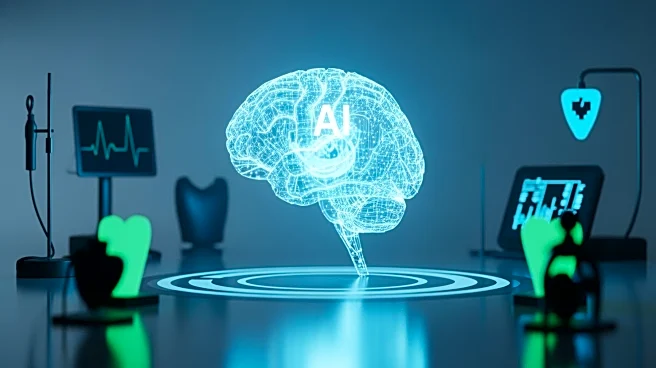What's Happening?
The healthcare industry in the United States is rapidly adopting artificial intelligence (AI) technologies, significantly outpacing other sectors in the economy. According to research by Menlo Ventures,
healthcare organizations have increased their implementation of domain-specific AI tools by 22%, a sevenfold increase over the previous year. Health systems are leading this transformation with a 27% adoption rate, followed by outpatient providers at 18% and payers at 14%. This surge in AI adoption is driven by the need to address administrative overhead, rising medical costs, and stagnant productivity in pharmaceutical and biotech sectors. AI is being utilized to improve efficiency, economics, and patient outcomes, with healthcare AI spending reaching $1.4 billion this year, nearly tripling from 2024. The industry is seeing the emergence of AI unicorns and startups capturing a significant portion of the market, particularly in areas like ambient clinical documentation and coding automation.
Why It's Important?
The rapid adoption of AI in healthcare is reshaping the industry by enhancing operational efficiency and improving patient care. This transformation is crucial as it addresses critical challenges such as clinician burnout, administrative costs, and the need for faster drug development. By automating processes like clinical documentation and prior authorization, AI reduces the burden on healthcare professionals, allowing them to focus more on patient care. The financial implications are significant, with AI offering potential cost savings and revenue recovery through improved coding and billing processes. As healthcare organizations continue to invest in AI, the industry is poised for further innovation and efficiency gains, potentially setting a precedent for other sectors to follow.
What's Next?
As AI continues to integrate into healthcare, organizations are expected to expand their use of AI beyond administrative functions to include diagnostics and patient care. Leading healthcare systems like Mayo Clinic and Kaiser Permanente are investing heavily in AI projects, indicating a long-term commitment to this technology. The focus will likely shift towards developing AI solutions that directly impact patient outcomes and streamline care delivery. Additionally, the competition between startups and established healthcare IT companies will intensify as both seek to capture market share in this rapidly evolving landscape. The ongoing development of proprietary AI models by pharmaceutical and biotech companies will also play a crucial role in accelerating drug discovery and development.
Beyond the Headlines
The ethical and regulatory implications of AI in healthcare are significant and will require careful consideration. As AI systems become more integrated into patient care, issues related to data privacy, algorithmic bias, and the transparency of AI decision-making processes will need to be addressed. Furthermore, the shift towards AI-driven healthcare may necessitate changes in workforce training and education to ensure that healthcare professionals are equipped to work alongside AI technologies. The long-term impact of AI on healthcare costs and access to care will also be a critical area of focus, as stakeholders seek to balance innovation with equitable healthcare delivery.









